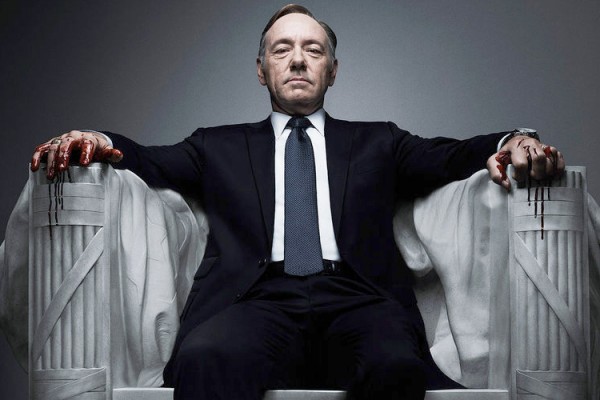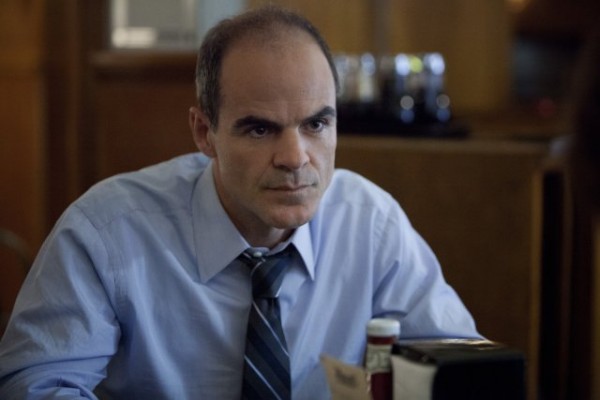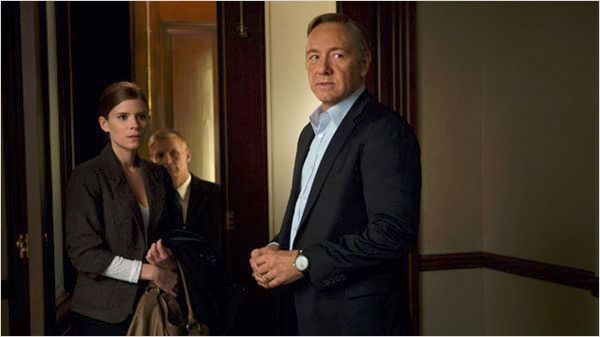
Courtesy of Netflix
Netflix dips into original programming with the Kevin Spacey political-drama that debuts an entire freakin’ season (13 episodes) all at once online on Friday, February 1.
Let’s bitch it out…
“I love that woman more than sharks love blood.”
Would most husbands (or wives) compare the love for their spouse to the ocean’s most aggressive predator and its animalistic lust for blood? Yeah, likely not … when describing love, typically images of hearts and Duchenne smiles with rosy cheeks come to mind.
But Kevin Spacey in Netflix’s new original political series, House of Cards, is anything but pastel pink. Every one of his calculating grins elicits chills rather than the warm fuzzies.
Spacey plays Frank Underwood, the Majority Whip of the U.S. House of Representatives, hell-bent on exacting revenge on the newly-elected President after he’s snubbed from his expected promotion to Secretary of State.
Based on the 1990s BBC series by the same title, Netflix’s upgraded version of House of Cards marks the on-demand provider’s second foray into producing original content. Unlike Netflix’s first original series, Lilyhammer, which was a co-production with NRK1 (a Norwegian broadcaster), House of Cards is all-American and a solo Netflix endeavor with an impressive cast that includes Robin Wright, Michael Kelly, Cory Stoll and Kate Mara.
After screening the first episode, I am sufficiently intrigued, but not jumping out of my seat wanting more like a TV-hungry couch potato/zombie (which I turn into from time to time). My caveat: I’m well aware that some TV series take a few episodes to sufficiently hook you in for the long haul (see: New Girl – contrary to cinephilactic, I’m in full agreement with TVAngie, who is clearly the purveyor of taste here, since New Girl is all kinds of laugh-out-loud bizarre-o fun…‘hair chut-e-ney’).
House of Cards feels like it could go either way – it may develop into a must-watch display of clever politico-scheming at best; or it will reinforce political and gender stereotypes, thereby making the series predictable and ho-hum at worst.
I’m hoping that the series will find its groove and present something fresh and intelligent. And since Spacey is one of the executive producers, I’m thinking (and hoping) that there’s plenty of unexpected Machevellian orchestration to come in the episodic queue.
What makes me hopeful is the addition of Robin Wright as Frank Underwood’s wife.
Wright as Claire Underwood is, without a doubt, the standout of the series. As the head of an environmental NGO, Claire is the picture of ruthless perfection and, after only two episodes, we already have a sense of the complexity of her character.
Claire wakes up before the sun to get in an early morning outdoor run. Her suits are well- cut and expensive. She is pretty, but plays down her sex appeal. The choice of her words, actions and mannerisms are all full of grace and bereft of any warmth. She’s all business. This means never expending more energy than is necessary and never letting anyone see her sweat. She’s in “full control” all the time and it’s scary.
But she loves her husband (perhaps just as much as his aforementioned blood-lust for her).
In one of the more enjoyable elements of these first two episodes, Claire demonstrates that she is not immune to the harsh realities of a bad economic environment and how difficult it can be for aging workers – albeit ever so briefly. After she decides to cut her staff in half in an effort to move the organization in a new direction, she enlists the help of her resistant office manager to carry out the soul-destroying task. And once that’s done, Claire (predictably) fires the 59-year old office manager.
This ruthless action is contrasted when she picks up an after-work latte and witnesses a senior cashier at the café fumble with the register buttons and get schooled by a young whipper-snapper of a co-worker. This gives Claire reason to pause and reflect. But only for a nanosecond. After which point, Claire snaps back out of it, opts for an evening run and returns to her steely, machinic state (I realize ‘machinic’ isn’t a word, but it should be, and for our current purposes, it is now. Copyrighted..)

It works because Wright is perfectly cast alongside Spacey. They make a slick devilish pair and I predict that the series will reach a fever pitch of eyeballic orgasm whence, if ever, these two characters find themselves on opposing teams. For now, however, Claire is the perfect complement to Spacey, whose character I’ll confess I haven’t yet taken a liking to. Yes, fine, as a viewer, you’re not supposed to like him because he’s a conniving, self-interested politician. But you know what I mean. Sometimes bad can be played so well that you can’t help but to root for the dark side.
Again, perhaps I will come around as the series progresses. There are moments when Frank breaks the fourth wall to address the audience, à la Carrie Bradshaw during the first season of SATC, and you see a little bit of that attractive Spacey kick. Or we catch him in an eyeroll meant only for us and suddenly we’re in on the scheming with him. These are the moments when Spacey and House of Cards pulls you in.
Other Observations:
- The dark side is made darker with Michael Kelly, who plays Doug Stamper, Frank’s chief of staff and partner in crime. Kelly plays the creepy and efficient right-hand man well.
- In carrying out a scheme to embarrass the President and his chosen elect for Secretary of State, Frank and Doug maximize on the salacious extra-curricular activities of young Congressman Peter Russo, played by Corey Stoll, blackmailing him to be the errand boy. Stoll plays the requisite over-stimulated, over-sexed and entitled politician with a greasiness that only a mother could love – which means that he’s also quite good in his role as the insecure and excessive Russo.

- Another element in the whole shebang is the role of the press, represented by an elfin Kate Mara, who plays cub newspaper reporter, Zoe Barnes. I really wanted to like this character since she is the young journalist ingénue, but I don’t. I don’t because it’s not for a lack of good acting. Mara is good with the material she’s been given and her delicate beauty is intriguing (she’s listed as a robust 5”3 on IMDB.com … but I don’t believe it.). I also don’t like this angle to the series because it feels tired and predictable.
- What really bothers me more is how sorely Zoe Barnes pales in comparison to the original literary character that she’s based on in both intelligence and savvy. So yes, the BBC series that this Netflix series is based on was based on a book of the same name published in1989 by British politician and author Michael Dobbs. The more you know!
- In the BBC series, the Zoe-equivalent, Mattie Storin didn’t slap out her boobs and wear a thong to advance herself. But she did SPOILER have an affair with the main character to get ahead END SPOILER. The Mattie Storin from the book did none of these things. She had brains and used them. In this 2013 version, Zoe has brains and she uses them, but she relies on her physical assets first. Ugh. Tired. Disappointing.
- The audience is supposed to realize that Zoe “really isn’t like that,” because she chooses hoodies and army jackets for the everyday. But in fact, she is “like that” and a poor representation of a strong young woman. Predictably, she embodies the stereotype of an insecure young woman using her sexuality to manipulate and get ahead professionally. We ain’t all like that. Brains over boobs, ladies.
- Side Note: Zoe’s paper – the Washington Chronicle – is filled with stuffy old naysaying editors who resist her belief that the paper needs to embrace the worldwide web. I’m sorry, but on what planet would a newspaper in the developed world shun the evolving nature of its business in today’s digital age?!
- With Zoe now getting the goods and writing better stories because she showed her goods, the audience is further treated to the bitterness of Janine (Constance Zimmer), the lead political correspondent for the paper. Predictably, Janine is all crusty and jealous because she’s older and Zoe is shiny and new and getting all the politi-scoops. There is no Janine-equivalent in the BBC series, someone who reinforces the additional stereotype that women are all catty bitches in the workplace. Again, ugh. Tired. Disappointing.
Bottom Line:
There’s time to hope that the women in this series will evolve into something more than the expected stereotypes. Wright’s Claire Underwood is the she-wolf to carry the series and there’s more than enough plot to keep intelligent viewers watching. It’s clear from these first two episodes that the worst (ie: the best, the most clever and the most shocking) is yet to come.
So I look forward to the series, though I will keep my gloves on while I watch, since politics truly is a bloodsport
House Of Cards debuts all thirteen of its first season episodes on Netflix February 1. A second season is already in the works.
It will be very tough to get close to what the BBC series (there were even 3 of them!) did. There’s some good actors/actresses in the cast, but this type of series should be done in a very subtle way and that’s what I fear most. The things you’ve described already sound a bit off.
Compared to the BBC series, the main characters are somewhat younger and I think that changes some of the dynamics as well. Mattie and the chief whip having an affair feels somewhat different (a bit of a father-figure thing) in the BBC series.
In the first series, the chief whip’s wife didn’t really get much quality screen time but she still managed to show off her capabilities to do everything to further her husbands’ case including ignoring his affair. The fact that’s she’s older (60+ I guess in the BBC series) gives her calculated and ruthless character some more power, since you wouldn’t expect that from such a person.